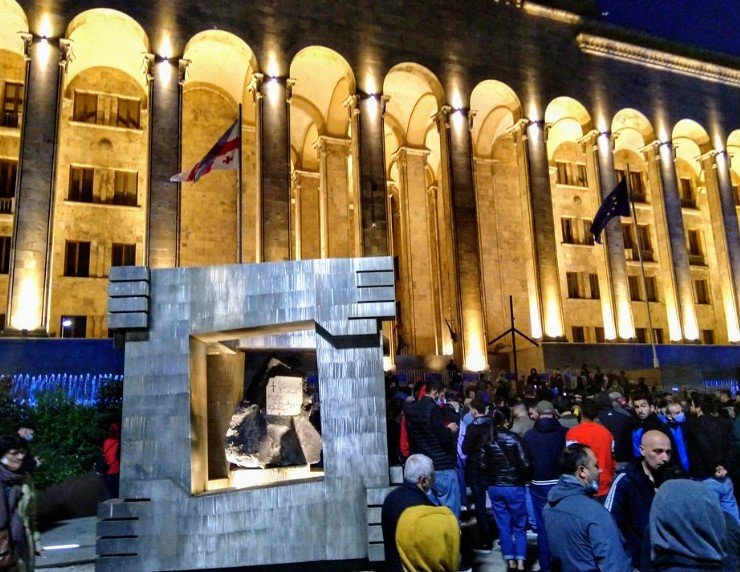Arrests of top pro-Western politicians intensify protests in Tbilisi and raise fresh concerns over democracy and Kremlin influence
Four prominent opposition figures are now behind bars in Georgia. That makes nearly all of the country’s pro-Western political leadership locked up — or effectively silenced — as anti-government protests continue to swell in Tbilisi.
It’s been a long, hot, angry summer in the capital. And there’s little sign of it cooling down.
A Government on the Defensive
The Georgian Dream party says these arrests aren’t about politics. Officials insist they’re based on specific charges, like “inciting public disorder” or “disrupting national unity.” But ask anyone outside the ruling camp — and the answers sound wildly different.
Critics, including EU diplomats and international watchdogs, say this is a calculated purge. A deliberate move to crush dissent. And, maybe most dangerously, a signal that Georgia is shifting away from its West-facing path and back into Moscow’s orbit.
This wasn’t supposed to be the story in 2025.
Georgia’s people — particularly its younger voters — have long pushed for integration with the EU. In 2020, nearly 80% of Georgians polled said they wanted EU membership. But since the controversial October 2024 election, that dream’s been slipping out of reach.

The Arrests That Sparked a Movement
The most recent detentions came in quick succession, rattling the opposition and energizing protesters.
• Nika Kvaratskhelia, a former deputy mayor of Tbilisi and vocal anti-corruption activist
• Levan Gurgenidze, a defense lawyer known for defending arrested demonstrators
• Salome Beridze, an ex-parliamentarian who led EU advocacy talks in Brussels
• Giorgi Alania, a student leader linked to the “March to Europe” movement
Each was charged within days of one another. And in each case, supporters say the charges are flimsy at best — and fabricated at worst.
One sentence, just to let that settle.
Their arrests come after months of rallies, marches, sit-ins, and hunger strikes across the capital.
Streets Stay Loud, Even As Cells Fill Up
Despite mass arrests and a visible police presence downtown, demonstrators keep returning. Every night, Freedom Square and Rustaveli Avenue fill with young people waving EU flags and chanting “No to Russia.”
Some bring flowers. Others bang pots and pans. The mood shifts between somber and explosive.
It’s no longer just about politics — it’s personal. For many, the fight is about the future.
Tamar Mikadze, a 22-year-old nursing student at Tbilisi State University, said her older brother was detained in May after attending one of the rallies. “He’s not even political,” she said. “He just wants to live in a free country.”
There’s been a wave of online fundraising to support detainees’ legal fees and families.
The International Reaction So Far
Western leaders are watching closely, though their words haven’t yet changed Georgia’s course.
The European Union released a cautious statement last week expressing “concern over democratic backsliding.” Meanwhile, the U.S. Embassy in Tbilisi said it was “deeply troubled” by the arrests and called for “a transparent legal process.”
But in practice? Not much.
In March, the EU officially paused Georgia’s accession talks, citing “serious rule-of-law concerns.” That was a gut punch for pro-democracy advocates. And some argue it gave Georgian Dream exactly what it wanted: less pressure, fewer consequences.
Here’s a look at recent EU-Georgia events in brief:
| Date | Event | Outcome |
|---|---|---|
| Oct 2024 | Disputed parliamentary elections | Ruling party claims majority |
| Nov 2024 | Daily protests begin in Tbilisi | Rallies grow across cities |
| Feb 2025 | Georgian Dream halts EU bid | Public backlash intensifies |
| Mar 2025 | EU suspends accession talks | Cites democratic backslide |
| Jun 2025 | Multiple opposition leaders jailed | Protests surge again |
Even some inside Brussels are worried the West is being outplayed — letting Georgia slide quietly into Moscow’s orbit without putting up a fight.
Is This Georgia’s Authoritarian Turn?
Observers say the signs are hard to ignore.
Independent media outlets have reported escalating censorship. Local journalists covering protests say they’ve been harassed, with some having press access revoked without explanation. And opposition lawmakers left in parliament say their microphones have literally been turned off during sessions.
It’s creating what some call a slow suffocation of political life.
And then there’s the Russia factor — always looming. Georgian Dream, while insisting it’s neutral, has been criticized for deepening economic ties with Moscow. After halting the EU process, Prime Minister Irakli Garibashvili signed a new trade memorandum with Russian-aligned Eurasian countries.
One paragraph. One sentence.
That sent a message. Loud and clear.
So What Comes Next?
It’s hard to say. The opposition has been weakened — but not wiped out. People are still on the streets. The EU hasn’t closed the door entirely. And Georgia’s history has proven one thing again and again: it’s unpredictable.
For now, protesters vow to keep showing up. Rain or shine. Flag in one hand, smartphone in the other.
Because for them, this isn’t just politics.
It’s identity. It’s belonging. It’s everything.
